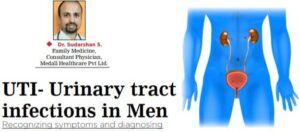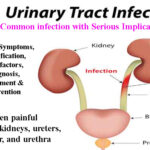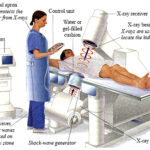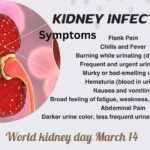Urinary tract infections (UTI) are more common in women than men. Untreated urinary tract infection involving kidneys can damage kidneys leading to acute kidney failure and/or chronic kidney disease.
Usually UTI (Urinary tract infections) are more common in women than men. This is because the urethra, a thin passage that connects your urinary bladder to the outside, is shorter in women than in men. However men can also get UTI if they have risk factors.


Risk factors for UTI in Men:
In young men, STDs (Sexually Transmitted Diseases) usually account for the UTI. In older men, prostate enlargement and diabetes are important risk factors for developing UTI. Chronic indwelling urinary catheters in hospice, home-care and hospitalised patients is also one of the risk factors for developing UTI.
Depending on the location and complexity, UTI is usually divided into upper urinary tract or lower urinary tract infection. Upper urinary tract infections include those in kidneys and urethra and they are usually serious requiring admission. Lower urinary tract infections include those in the urinary bladder, prostate or urethra.
Symptoms of UTI:
Symptoms of urinary tract infection depend on location. When infection involves the bladder and/or urethra, symptoms include urinary urgency and increased frequency of urination, lower abdominal pain, pain or burning sensation in penis while urinating. One may also develop fever or chills. If the infection involves prostate, one may experience similar symptoms and additionally pain after ejaculation, difficulty in passing urine. Upper urinary tract infections include fever, chills, shivering, nausea, vomiting and abdominal or back pain. If not treated early, upper urinary tract infections lead to a serious condition called sepsis, where the infection enters the bloodstream.
Diagnosis of UTI:
History and clinical examination usually narrow down the diagnosis. The doctor may run additional tests like urine examination, urine culture and sensitivity of bacteria to antibiotics and in some cases, ultrasound of the abdomen/pelvis. If an STD is suspected, the doctor may run additional tests to identify the bacteria. Most of the STD related urinary tract symptoms are caused due to gonorrhea or chlamydial infections.
An upper urinary tract infection may require imaging like an ultrasound or a CT scan for the diagnosis and also to rule out any obstruction to the urinary tract.
Treatment of UTI:
Antibiotics are the treatment of choice for UTI. The choice of antibiotics and method of administration depends on the causative organism and its response to the antibiotics, the location of the infection. Simple lower urinary tract infections like a bladder infection may need antibiotics for up to a week. Acute infections of the prostate usually require treatment with antibiotics for 2 to 4 weeks.
Infections of kidneys, if severe, require hospitalization and treatment with intravenous antibiotics. One may need antibiotics for up to 2 weeks. Surgical intervention may be indicated at times if there’s an obstruction to urinary passage and severe infection or pus collection in the kidneys which are refractory to antibiotic therapy. Treatment of bacterial STDs is organism specific and involves antibiotics.
Why treating UTI early is important?:
Untreated urinary tract infection involving kidneys can damage kidneys leading to acute kidney failure and/or chronic kidney disease. If the infection enters the bloodstream, it can cause sepsis, shock and even death. In certain situations infections can spread to genital tract such as epididymis, testes. These are usually seen in STDs.
How to prevent UTIs in males?:
Symptoms related to enlarged prostate have to be treated with the help of medications that can ease the urinary flow. Diabetes should be well controlled. Appropriate use and care of urinary catheters are important. In young males, usage of condoms prevents STDs and its complications. Certain urological procedures need prophylactic antibiotics that prevent infection.


Dr. Sudarshan S.
Consultant Physician
Medall Healthcare Pvt Ltd.











